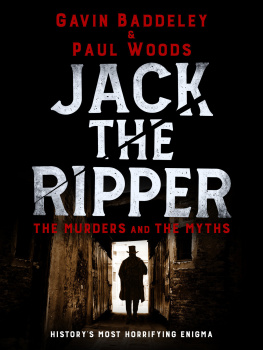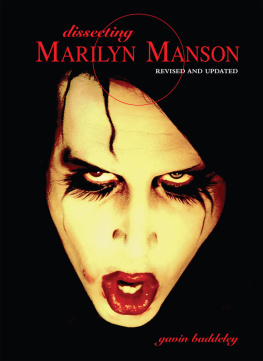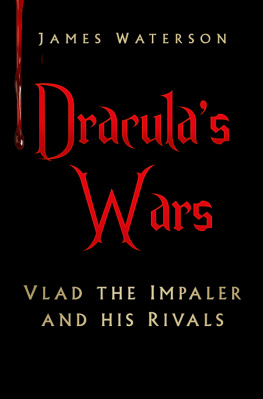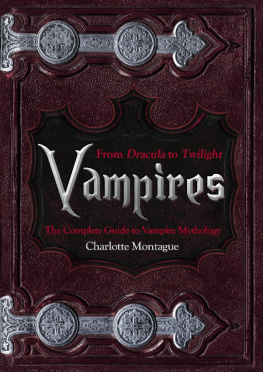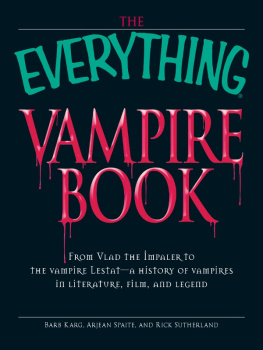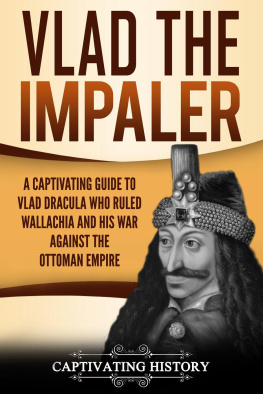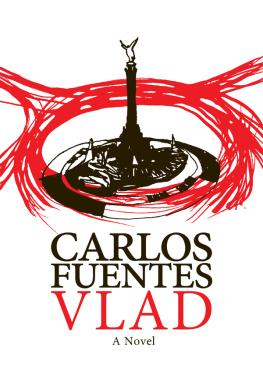Gavin Baddeley - Prince Dracula: The Bloody Legacy of Vlad the Impaler
Here you can read online Gavin Baddeley - Prince Dracula: The Bloody Legacy of Vlad the Impaler full text of the book (entire story) in english for free. Download pdf and epub, get meaning, cover and reviews about this ebook. year: 2022, publisher: Canelo, genre: Detective and thriller. Description of the work, (preface) as well as reviews are available. Best literature library LitArk.com created for fans of good reading and offers a wide selection of genres:
Romance novel
Science fiction
Adventure
Detective
Science
History
Home and family
Prose
Art
Politics
Computer
Non-fiction
Religion
Business
Children
Humor
Choose a favorite category and find really read worthwhile books. Enjoy immersion in the world of imagination, feel the emotions of the characters or learn something new for yourself, make an fascinating discovery.

- Book:Prince Dracula: The Bloody Legacy of Vlad the Impaler
- Author:
- Publisher:Canelo
- Genre:
- Year:2022
- Rating:3 / 5
- Favourites:Add to favourites
- Your mark:
- 60
- 1
- 2
- 3
- 4
- 5
Prince Dracula: The Bloody Legacy of Vlad the Impaler: summary, description and annotation
We offer to read an annotation, description, summary or preface (depends on what the author of the book "Prince Dracula: The Bloody Legacy of Vlad the Impaler" wrote himself). If you haven't found the necessary information about the book — write in the comments, we will try to find it.
Prince Dracula: The Bloody Legacy of Vlad the Impaler — read online for free the complete book (whole text) full work
Below is the text of the book, divided by pages. System saving the place of the last page read, allows you to conveniently read the book "Prince Dracula: The Bloody Legacy of Vlad the Impaler" online for free, without having to search again every time where you left off. Put a bookmark, and you can go to the page where you finished reading at any time.
Font size:
Interval:
Bookmark:

Behold an Empire of Blood
The once verdant fields around the besieged city are burning to black ash. The foliage is scraped from the naked earth, robbed of its dignity like the flesh and hair scraped from a flayed prisoners scalp. As seen through the dying soldiers eyes it is a vision of the infernal, yet it is arranged like the bloodstained icons of the accursed Christian infidel.
For our staked and crucified young man imploring the mercy of death, if not the promise of Paradise, to visit him soon is of the army of Mahomet. He has fought in the name of his Sultan, near-namesake of the blessed Prophet himself, and now he will spend out his last agonised moments here, outside the distant infidel city of Trgovite.
The nightmare landscape that fills his field of vision is borne witness by his terminating senses, and supplemented by his fevered mind. As the maimed and the mutilated howl and whinny, he perceives one who moves impervious, untouched, through the carnage. It is the creature whose name his people have damned with their verbal curses and sprayed sputum. It grows closer, moving with stealth and confidence through the bodies of those broken and torn asunder. Swatting away arrows with the distracted air of one who brushes away a dungfly.
This demon, its thin downturned mouth gorged on sticky dark lifeblood, is the hated Prince of legend. The defender of a decadent Christendom, said to feast on the dying of the battlefield whether they be his own men or his noble Ottoman foe.
The hair of the monster is lustrous and black, as if he were one of the soldiers fellow countrymen, yet his whey-like skin betrays the pallor of one too suffused with death. This is the face of the unbeliever. The obscene. The unholy. Its fetid breath pollutes the air, choking the Turkish warrior as his own respiration becomes more laboured.
Pain and terror narrow the young mans eyes until they are no wider than slits. But he can feel the hand of the Impaler upon him, and cannot retreat from the tormented tableaux of which he forms a part. Cannot resist the probing talon that seeks to draw bloody sustenance from the gushing wound of his lower abdomen
The apparition fades suddenly like a transient fever nightmare. In his agony, the young Turk finds his delirium ebbs and flows with every perspiration-drenched, arrhythmic beat of his agitated heart.
For he has been placed on this war-weary hillside that Allah has surely forsaken, assembled among rows of dying bodies as part of a crazed recreation of the suffering of the Christian prophet. He that would defend the culture of the Christ has crucified his prisoners of war, but with no such finesse as once displayed by the executioners of Ancient Rome.
Held down screaming as the Princes lackeys drove the sharpened end of a wooden shaft into his bloodied rump, the Ottoman warrior has now become one with the stake from which he is suspended. Held limply aloof by the very thing that leaks the lifeblood and viscera from his punctured body, he is flooded by the mysterious chemical elements from which his god created him.
In such extremes of agony, madness is perhaps the only mercy. He cannot think rationally, for pain touches every fibre of his being. He cannot breathe, for in this parody of the crucifixion he is not the crucified but the broken cross, his arms and shoulders drawn gravitationally downwards, his dangling legs unable to support the pierced chest that harshly and rapidly gulps in air but is unable to exhale. The stake that passes through his upper chest and exits his back has ruptured his very humanity, leaving him a twitching, gasping mockery of that which the imams once told him was created in the form of the divine.
Yet it still leaves him mercilessly alive, trapped in a consciousness for which the only reality is pain.
If Allahs mercy were visited upon him now then all human sentience might end. Instead, that which he formerly beheld as the infernal aftermath of war becomes less grandiose in his dying moments. Burnt shrub. Splintered trunks of pine and beech. The moans of the wounded and the tortured are less real to him as his own suffering blocks out all else and his senses start to dim.
But the figure of the accursed infidel still remains, aloof and dispassionate among the rows of transfixed and impaled bodies. Immune to the piteous cries of the wounded and maimed who will never step foot within the modest little city over which he stands guard.
Behold, the Voivode of Wallachia; defender of a piss-pot kingdom of dirt. Lean and Latin of face, this is no monster but a very singular kind of man.
The Ottoman soldier tries to cry out, to implore his god to release him from his suffering with the gift of sudden death, whether by sword, fire or strangulation. But a voice needs the support of an upper body, and his is torn and twisted
Vlad Tepe strides forward, eyeing his dying captives with a curiosity that still seeks the spiritual reality of death, no matter how many times he has witnessed its bodily contortions. And yet he remains unmoved by the agonies of the dying.
The young man feels a sickness at the root of the pain which tears apart his soul. To be gawped at in this moment of utter desolation by such a man is to deprive him of the dignity of a dog
Vlad III, son of the dragon, is no demon when seen at close quarters. No blood-gorging vurdalak but the well-weathered face of provincial power, his alert carrion eyes perched above a nest of angular bone and brush whiskers. The despotic ruler of a European backwater who would slaughter everyone in it indeed, would lay waste to everyone and everything in the world rather than relinquish one remote acre.
As Vlads inscrutable gaze meets the dying agony of the Turkish soldier, the young man begins to choke and rattle as if coughing up his pierced guts.
It is just one more death and it matters not a jot in an uncertain world where the maintenance of power is a full-time occupation, and must be attended by any means possible. Wordlessly, instinctively, our young soldier of the Sultans army expires with the knowledge that he has been destroyed not by some monstrous folk demon but by something worse.
Something human.
All too human
The belief in a supernatural source of evil is not necessary; men alone are quite capable of every wickedness.
Joseph Conrad
In common with most Westerners, these authors first discovered Transylvania through the pages of Bram Stokers 1897 novel Dracula, and the midnight tidal wave of Gothic film, literature, and suchlike which have followed in its wake. Indeed, many in the West still suppose it to be a legendary realm, a creepy equivalent of such fictional kingdoms as Narnia or Oz. Theres less excuse for such ignorance of Eastern European geography in recent decades, largely due to the publication in 1972 of In Search of Dracula, a landmark American study by the history professors Radu Florescu and Raymond T. McNally. The book first popularised the idea that, not only was Transylvania a real place, a region to be found in Florescus native Romania, but also that Dracula was a real person, otherwise known as Vlad III, Vlad the Impaler, or Vlad Tepe (pronounced Tsepesh Impaler in his native tongue).
Vlad was a Wallachian Voivode, born in the region of Transylvania around 1431. But just what is a Voivode, or indeed a Wallachian? Wallachia is a region which, along with the neighbouring principalities of Transylvania and Moldavia, forms the modern nation of Romania. Voivode is an Eastern European term that translates roughly as warlord, though the exact meaning varies by nation and era. In our case, the position also involved leadership during peacetime (admittedly comparatively rare in Vlads day) making it somewhat akin to the post of the governor of a province (the term survives in this context in modern Poland, where regions are still administrated by Voivodes, centrally appointed by the Polish Prime Minister). Yet in Transylvania and Wallachia voivodeship had a hereditary component, and is thus also sometimes translated as prince or duke (though, sadly, seldom as count). Vlad the Impaler inherited both the voivodeship of Wallachia and his infamous epithet from his father, Vlad II, otherwise known as Vlad Dracul Dracula meaning son of Dracul.
Font size:
Interval:
Bookmark:
Similar books «Prince Dracula: The Bloody Legacy of Vlad the Impaler»
Look at similar books to Prince Dracula: The Bloody Legacy of Vlad the Impaler. We have selected literature similar in name and meaning in the hope of providing readers with more options to find new, interesting, not yet read works.
Discussion, reviews of the book Prince Dracula: The Bloody Legacy of Vlad the Impaler and just readers' own opinions. Leave your comments, write what you think about the work, its meaning or the main characters. Specify what exactly you liked and what you didn't like, and why you think so.

